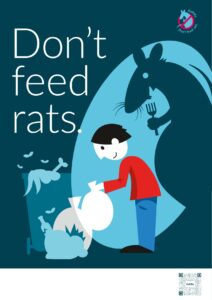
Public Spaces
Open spaces such as parks and playgrounds are attractive to rodents for a number of reasons. These areas may have easy access to water (i.e., fountains, standing water from frequent over-watering). Moreover, these areas have continually replenished food sources such as trash containers with uneaten human food. If visitors feed the bird or squirrels during the day, some uneaten food may be left for rodents after sunset. Additionally, parks are typically surrounded by landscaping that provide harborage, insects, snails, slugs, and bird eggs. These communal areas are usually not in use by humans at night, giving rodents a safe place to eat, drink, roam and breed.
Rodent management in open areas is principally achieved by poisoning with rodenticide. These areas are hunting grounds for raptors (such as owls). Residents can help reduce the rodent population by targeting the supports that make life possible for rodents.
- If you host an event like a birthday party that will generate food trash, please consider bagging your refuse and throwing it in your container at home. Staff are not available to empty the cans on holidays and week ends. Whatever you leave on Saturday will not be removed until Monday (or even Tuesday).
- Do not leave bags of trash sitting beside a full can.
- Try to clean up spills and crumbs.
- Don’t feed bird or squirrels.
- Report evidence of over-watering to
- ICHA Community Management
- Kim.Hockings@icha.uci.edu (949) 824-2424
- Andrew.Herndon@icha.uci.edu (949) 824-4068
- Report overflowing trash cans to
- ICHA Asset Management
- Ron.Reid@icha.uci.edu (949) 824-2432



